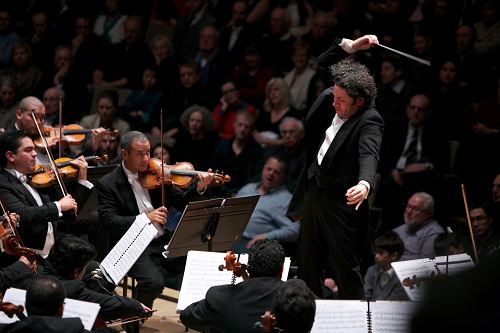 United Kingdom Stravinsky: Simón Bolívar Symphony Orchestra of Venezuela / Gustavo Dudamel (conductor). Royal Festival Hall, London. 14.1.2016. (JPr)
United Kingdom Stravinsky: Simón Bolívar Symphony Orchestra of Venezuela / Gustavo Dudamel (conductor). Royal Festival Hall, London. 14.1.2016. (JPr)

Royal Festival Hall, Southbank Centre 14.01.16 © Nohely Oliveros
Stravinsky, Petrushka; The Rite of Spring
This was my third encounter with Gustavo Dudamel; the other times I have heard him with his Venezuelan orchestra have been disappointing overall whether it was Mahler in 2011 or Wagner in 2015. Then I was on ‘home territory’ musically but an all-Stravinsky programme is not something I would usually attend, although I am aware of the music from its use in ballets that I have seen. And there was the same problem for me with this concert as the Wagner one … does Dudamel ever tell his players enough about the background to the music? He could have done no better than read to them the ‘Listening Guide’ in Bruce Hodges’ wonderfully lucid programme notes and then they might have understood the ‘story’ behind all the notes they were playing.
A while ago the Simón Bolívar Symphony Orchestra lost the ‘Youth’ from its title but its 180 members are still those who have been trained under Venezuela’s El Sistema Orchestral Academic Program. Many are now middle aged to judge by some receding hairlines or hints of grey. Despite Dudamel’s responsibilities as music and artistic director of the Los Angeles Philharmonic he remains the figurehead ambassador for El Sistema and the power of music to change lives both inside and outside Venezuela, and is in his 17th season with them.
Perhaps even Stravinsky realised that a little of his music goes a long way and I believe the composer never played his three revolutionary ballets for the Ballets Russes in a single concert but in 1940 he did, I understand, perform a suite from The Firebird alongside Petrushka and The Rite of Spring. With a smoothly played and acceleratingly dramatic Finale to Firebird played as an encore after the remaining two ballet scores, Dudamel almost emulated the composer. With a maraca-shaking percussionist marauding through the vast body of strings for the joyous Aires de Venezuela (some traditional music by Pedro Elías Gutiérrez) it nearly raised the roof off the Royal Festival Hall and once again – for a concert in my experience – the encores seemed to outshine what had gone before.
Petrushka had been reinstated into the concert programme after being replaced after its initial announcement by The Firebird. I do need to hear (see?) in all the jagged dissonances, harsh bitonality and jump-cuts the hustling, bustling, Shrove-Tide Fair and the antics of the puppet characters (Petrushka, Ballerina and Moor) I know so well. Although huge forces were still needed – though not the fullest orchestra used for The Rite – what we heard was apparently the 1947 revised version of Petrushka ‘scored for a slightly smaller orchestra’ than the 1911 original – the orchestra filling the platform was not small by any means! The Fair throbbed with tremendous energy, and later it became clear how Petrushka pre-echoed The Rite in its rhythms, and in the whiny flute and bassoon solos which were a highlight of the performance. In my ‘mind’s eye’ I never saw the lovelorn Petrushka, the object of his affection or his rival. Dudamel never really made the puppets ‘dance’ for me nor allowed the rich colours of the composer’s imagination to burst into real life. He shredded asunder the Waltz of the Ballerina and the Moor but the riotous final tableau was played empathetically with the horror and violence suitably juxtaposed against the merriment. A huge bear did seem to tower over the drunken, carousing peasants, but Petrushka’s death was glossed over, as well as the denouement, when the ghost of the murdered puppet should spectrally return.
After the interval it was The Rite of Spring and quite why its first performance in Paris in 1913 caused such as furore is somewhat unimaginable now … I guess you had to be there at that time and place? It must be a tremendous technical challenge to which the Simón Bolívars rose wonderfully and they sounded more at ease with The Rite than Petrushka – though ‘ease’ is not a descriptor in any way for this music with all its near-hysterical rhythms and famed crashing sonorities. This was a visceral performance of sheer orchestral brutality with Dudamel doing his best to restrain all the violence as best he could, especially during the ‘Dance of the Earth’. The crowds were heard baying for blood and the death ritual and the ‘Adoration of the Chosen’ could not have been more grotesque. As it all ended there was music carnage but because it had all been loud, if not louder, the composer’s ‘rhythm upon rhythm’ (as Bruce Hodges’ programme note described this ending) never got out of control because it was barely in control – there was mob rule throughout – and so I found the ending a little underwhelming.
Jim Pritchard
For more about concerts at the Southbank visit http://www.southbankcentre.co.uk/.
